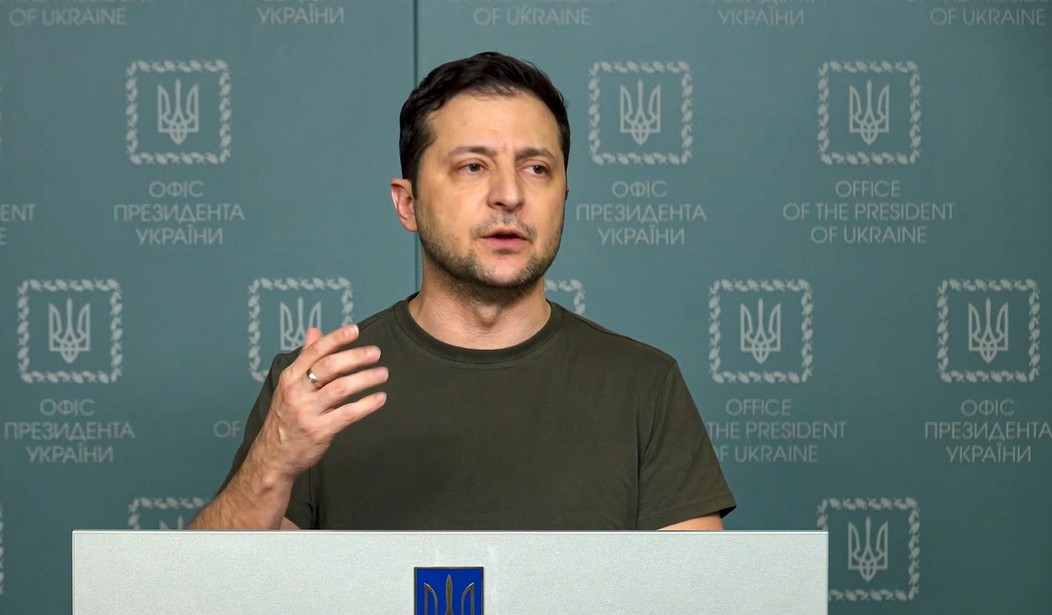In every war that's ever been fought, someone steps forward and claims to have the plan for "victory." Army Air Force Chief Gen. Curtis LeMay said his Air Force would flatten Japanese cities and force Japan to surrender. Japan kept going anyway.
Meanwhile, British General Bernard Montgomery claimed that his plan to smash the industrial heart of Germany's Ruhr Valley would bring the war to an end by 1944. Henry Kissinger said "Peace is at hand" right before the 1972 election. The war ended three years later.
Ukraine is no different. All that's missing from the "plan" is the promise that "the boys will be home for Christmas."
The outline of the "plan" is more of the same that came before: more guns, more ammo, more planes, more tech, plus permission to bring the world to the doorstep of World War III. President Volodymyr Zelenskyy will brief Joe Biden, Donald Trump, Kamala Harris, and the rest of Congress about the plan on Thursday. In truth, there's nothing new as far as what Ukraine needs to stay in the war. It's being called a "victory plan" because to call it "a plan to continue the stalemate" isn't quite as catchy.
What's actually dictating the timing of the plan is a looming victory for Donald Trump. Trump says he can end the war in 24 hours. That's not going to happen, of course, but what Zelenskyy fears is that Trump will force a settlement that will leave 20% of Ukraine in Russia's hands.
As bad as that would be for Ukraine, Zelenskyy may not have a choice. His eastern armies in the Donbas are being chewed up and spit out by Russia. His "incursion" into the Kursk region of Russia, though startingly brave and daring, is not achieving any useful strategic objectives.
Zelenskyy knows this which is why he will need to get Biden to back his "victory plan" immediately. And to do that, Zelenskyy is putting on a full-court press to convince him.
He is almost camped out at the United Nations. He spoke on Monday at a debate about how the UN should be reformed. He addressed the Security Council on Tuesday. And he is giving a speech to the General Assembly on Wednesday.
In between, he is meeting world leaders and US politicians. He visited an ammunition factory in Scranton, Joe Biden’s hometown in Pennsylvania, one that is making shells for Ukrainian artillery batteries.
And he is explicit that he considers time is short. In one of his many media interviews, Zelensky told the New Yorker that the victory plan had to be agreed - and Ukraine strengthened - in October, November and December.
Getting Congress to act quickly and deliver massive amounts of armaments in less than three months is delusional, especially since Zelenskyy wants a security guarantee that Ukraine will be asked to join NATO.
Congress doesn't move that fast even in a non-election year.
One thing that Biden could do before the end of his presidency is approve Ukraine's use of Western long-range missiles to strike deep into Russia, targeting munitions, infrastructure, and airfields. It has the potential to make a significant impact on Ukraine's security.
But Ukraine doesn't have enough of them to make the missiles a war winner. And Vladimir Putin has said more than once that an attack by Ukraine using Western missiles against targets deep inside Russia would be taken as an attack by the West.
Putin has bluffed several times before about the "red lines" he's set up. He warned the West about supplying Ukraine with advanced tanks, fighter jets, high-tech artillery, and long-range missiles. Each red line was crossed without a military response from Putin.
Does that mean that Putin won't respond to a provocation that kills Russian soldiers and perhaps civilians in a missile strike? The ultimate question is simple: Do the potential gains of using long-range missiles outweigh the risk of war with Russia? Biden has rightly believed that up to this point, it wasn't worth the risk.
The "victory plan" has no chance of bringing about the kind of ceasefire that Zelenskyy desperately wants.
“It will lead to a freezing of the conflict, nothing more: Occupied territories are considered occupied. Sanctions against Russia remain. The intensity of war drops significantly but it continues,” one presidential advisor told AP.
The sad fact is that unless the U.S. is ready to send troops to Ukraine and fight Russia in a costly, bloody ground war, with the threat of nuclear war hanging over the battlefield, no "victory plan" by Zelenskyy is viable.










